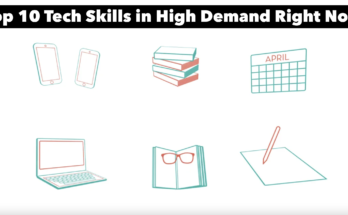In an era characterized by rapid technological advancements, our daily lives are constantly transformed by innovations that improve convenience, connectivity, and efficiency. As we navigate the complexities of the modern world, several technology trends stand out and are fundamentally changing the way we live, work, and interact. Here, we consider the top 10 technology trends that will significantly change our lives.
1. Artificial Intelligence (AI) and Machine Learning
Artificial intelligence (AI) and its subfield, machine learning, have rapidly integrated into various fields and fundamentally changed the way we approach tasks. From virtual assistants like Siri and Alexa to advanced algorithms that analyze consumer behavior, AI improves efficiency and decision-making. In healthcare, AI supports diagnosis and treatment planning and predicts patient outcomes with remarkable accuracy. While businesses leverage AI for customer service and operational efficiency, individuals benefit from experiences that are customized to their preferences.
2. 5G Connectivity
The introduction of 5G technology represents a major advancement in mobile connectivity, offering faster speeds, lower latency, and the ability to connect more devices simultaneously. This revolution will improve everything from streaming services to online gaming, providing users with a seamless experience. Additionally, 5G will enable the Internet of Things (IoT) to flourish, enabling smart homes, connected vehicles, and smart cities to thrive. Greater connectivity will enable us to interact with technology more smoothly, paving the way for new applications and innovations.
3. Remote Work Technology
The COVID-19 pandemic has accelerated the adoption of remote work technology, forever changing the landscape of work. Platforms like Zoom, Microsoft Teams, and Slack have become essential for communication and collaboration, allowing teams to work effectively from anywhere in the world. As companies adopt hybrid work models, tools that support productivity, project management, and employee well-being are more important than ever. This change not only improves work-life balance, but also opens up employment opportunities across geographic boundaries.
4. Augmented Reality (AR) and Virtual Reality (VR)
Augmented reality (AR) and virtual reality (VR) are changing the way we experience the world around us. From immersive gaming experiences to virtual tours and training simulations, these technologies are creating new dimensions of interaction. In education, AR and VR provide hands-on learning opportunities, allowing students to engage with complex topics in ways they never imagined before. Retailers are also using AR to enhance the shopping experience by allowing customers to visualize products in their own space before purchasing.
5. Sustainable Technology
Demand for sustainable technology continues to grow as awareness of climate change increases. Innovations such as solar panels, electric vehicles, and energy-efficient appliances have become mainstream, helping consumers reduce their carbon footprint. In addition, businesses are adopting sustainable practices in their operations and leveraging technology to minimize waste and optimize resource use. The rise of green technology not only addresses environmental concerns, but also promotes a more sustainable economy and encourages individuals and businesses to make environmentally friendly choices.
6. Blockchain and Cryptocurrency
Blockchain technology was originally developed for cryptocurrencies such as Bitcoin, but is now being considered for broader applications across a variety of industries. This distributed ledger technology improves transparency and security, making it an attractive solution for supply chain management, finance, and healthcare. As cryptocurrencies grow in popularity, individuals are seeking new ways to invest and transact, challenging traditional financial systems. The growing interest in digital currencies represents a shift toward a more decentralized economy that enables greater financial inclusion.
7. Healthcare Innovation
The healthcare sector is undergoing a technology-driven transformation, leading to improved patient care and better outcomes. Wearable devices such as smartwatches and fitness trackers allow individuals to monitor their health in real time, encouraging proactive health management. Telemedicine has emerged as a key solution to enable remote consultations and access to medical services, especially in underserved areas. Furthermore, advances in biotechnology and personalized medicine are paving the way for tailored treatments for individual health needs.
8. Advances in Cybersecurity
As technology advances, so do threats to digital security. Cybersecurity has become a top concern for individuals and organizations alike. The rise in sophisticated cyber attacks requires robust security measures, leading to innovations in encryption, authentication, and threat detection. AI-driven cybersecurity solutions are emerging that identify and mitigate risks in real time, protect sensitive data, and ensure user privacy. In an increasingly digital world, the importance of cybersecurity cannot be overstated.
9. Internet of Things (IoT)
The Internet of Things (IoT) refers to an interconnected network of devices that communicate with each other and exchange data. From smart thermostats to connected kitchen appliances, IoT technology brings more convenience and efficiency to our daily lives. Smart homes equipped with IoT devices enable remote monitoring and control, optimizing energy consumption and improving security. As IoT continues to expand, it is expected to revolutionize industries such as agriculture, healthcare, and transportation, driving innovation and efficiency.
10. Quantum Computing
Quantum computing is still in its early stages, but it has the potential to revolutionize problem solving across a wide range of fields. Unlike traditional computers, quantum computers use the principles of quantum mechanics to perform complex calculations at unprecedented speeds. This technology has the potential to transform industries such as drug discovery, materials science, and cryptography. As researchers and companies invest in quantum computing, the impact on our future is immense, and we can expect breakthroughs that could transform entire fields.
Conclusion
The technology trends that are shaping our lives are not just buzzwords; they represent a fundamental shift in the way we interact with the world around us. As we embrace these innovations, we also face a responsibility to overcome the challenges they bring. From ensuring data protection to promoting sustainability, the future of technology depends not only on advancements but also on thoughtful implementation. By leveraging these trends, we can create a world that not only improves our lives, but also contributes to a more equitable and sustainable future.



